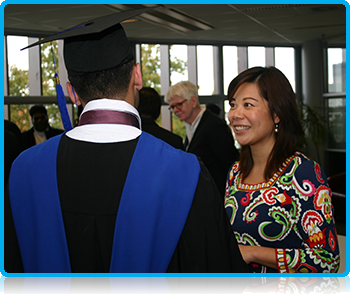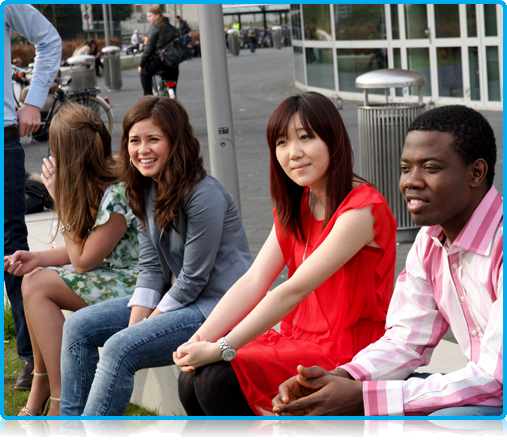Wittenborg Online News!
Wittenborg University just finished a good year in 2013! What are the prospects for 2014?
Wittenborg University just finished a good year in 2013! What are the prospects for 2014?

Wittenborg University just finished a good year in 2013! What are the prospects for 2014?
Wittenborg director, Maggie Feng, explains in an interview with WUP's Anesca Smith, that students and staff can look forward to many new initiatives - this include better accommodation, closer cooperation between Wittenborg and businesses as well as a new MBA-program to be added in September. She also gave advice for students who will be seeking an internship or a permanent job this year on how to make their CV stand out from the rest.
What are some of the highlights on the Wittenborg agenda for 2014?
Since we moved from Deventer to Apeldoorn in 2010, student accommodation has been a continued challenge. Ideally we want a building that is totally managed by Wittenborg and can accommodate 80 - 100 students. It must be a large building in a workable environment, close to facilities, right in the centre and at an affordable price. Better quality than what we have now. I promised myself to have this project finalized in 2014.
The concept has also changed. Before we said we are an educational institute, not a property manager or “investors in stone” as they say in Dutch. That means we have been dependent on other people’s projects, willingness and finance. If they don’t invest in student accommodation, as a result we wouldn’t have better student accommodation. Now we will turn this around. As an institute we will now go to the (property) market and take a calculated risk.
So you will invest in real estate?
Yes, it’s unavoidable. Imagine someone with 20 kg luggage arriving at Schipol airport after 15 hours of traveling: a bed is the only thing they are thinking of. We must be able to provide this.
Quite true. It is a great comfort when you come from another country and you know you have a place to stay.
Yes, and for the parents as well. For them to know you arrived safely and you have a warm place to stay. Although we are already doing that, the price and quality of the accommodation is not satisfactory. It was set out as a temporary solution and is still temporary after three years. That has been quite a pain in the past years so we are going to turn things around and dig ourselves in the real estate market, cut out the middle men.
 Can you talk about the expansion of Wittenborg University as it has been frequently mentioned last year?
Can you talk about the expansion of Wittenborg University as it has been frequently mentioned last year?
Our long term goal is the establishment of five schools - we are talking about the next 10 to 15 years. As a long term ambition, we started with the business school. The next one to come and which we have just formalized - though not from the branding point of view - is the school of hospitality and service management. Then, depending on the partners and the business opportunities we have, we are looking at a school for art and technology as well as health care and, in the very long term, a school of education. The concept of “international” and “management” will be the current running through all the programs.
Will any new programs added in 2014?
Yes, the specialisations in Event Management and Tourism will be added to the current IBA Bachelor portfolio of programmes from September, and we are also in the process of peer-review as part of an accreditation process of a new international MBA-program. If things go smoothly, we will be able to start in the next academic year. This program is aimed at attracting international-orientated bachelor graduates. The idea is to give them broader management skills - from finance to human resource. Our ideal target will be BA-graduates with a non- business background and experience.
And again (like the MSc programmes) it will be offered both part-time and full-time?
Yes. We want to create a link with the top sectors in the Netherlands as described by Dutch policy. We want to interact more with these sectors with a view on providing expertise to companies on internationalization or how to improve their current internationalization. We want to market ourselves to employers - from entrepreneurs to small and medium enterprisers. They need to know we are here and we need to know what support they need. For instance, we can provide expertise on how to do business with South Africa or any other country. We have so much expertise within this international pot we’re sitting on. The time has come to really promote ourselves so that more companies will come with project week assignments or willing to be guest lecturers or give seminars.
It sounds like your plans are well in line with what the Dutch government is also trying to promote - namely not to have education and business work in silos but cooperate.
Interaction is great for innovation, but very difficult to create. We can provide the platform for people to share, so innovation can be created in such a way. We are actively working with the local business clubs and associations as well as employer agencies. One way is to try and be the core organizer for business-to-business events so we can somehow put ourselves under the spotlight, yet it should not cost an arm and a leg. We would be happy for instance to co-host such an event, but at the end of it every business there should know about Wittenborg.
This will also help with finding students suitable internships?
Yes, sure. In the next academic year it would be really great to have companies standing in line waiting for our students to intern with them, rather than the other way around. We are not ambitious in the sense that we have lost sight of who we are. We are proud to be a small school. When you are huge, you trade in your flexibility and sit behind the desk, go through the procedures and forget about people’s faces behind the email.

What are the current issues in higher education you think?
There is always going to be tension between the required level of education from government and the requirements of employers. Between the moment you start teaching a program and by the time the student obtained a degree, the world has changed. So you have to make sure the content of your subject is flexible and stay innovative. At the same time you must meet the quality standards set by government. Internationalization will continue to be a trend, but people have such a vague understanding of what that means. Government looks to attracting more international students, however feelings of isolation are still very strong among (these) international students and trying to keep graduates here in the Netherlands remains tough.
So, everyone is talking about internationalization but many organizations do not have the know-how of translating it into a working model for themselves?
Yes. For instance, many companies are still producing loads of documents or having meetings only in the local language. Understanding small things like your staff wanting to have a warm lunch is still a problem. You must make them feel at home. If not, they won’t stay. That would be the real challenge for Holland. You can attract top experts to your country but to make them feel at home is not easy.
Wittenborg remains for the time being a business school. As this is one of the most popular study programs in the Netherlands, what advice would you give students at Wittenborg to distinguish themselves?
Although it can be very difficult to find work-experience anywhere, I would say maybe you are not looking hard enough. For instance, you can do volunteer jobs or associate yourself with a local organization. In that way you develop an understanding of how things work locally and you establish a network. Outside your study you have to have a hobby, so you can try and convince your future employer you are also a normal person with a good heart. A lot of students are still very laid back, like in high school: You teach me, I study and then I go to the exam and after that I hand everything over to my teacher.
...and through the whole holiday I stay holed up and watch TV-series after TV- series...
Exactly. Sit behind the computer and just do Facebook and things that do not give you any credentials for your CV. Put yourself out there. There will be places who would be happy just to have a helping hand - house for the elderly for example. Bring them a coffee. Learn your local language.
...because you never know when and where someone will notice you, right? Yes, even if you just make an effort to get to know your healthcare system or local economy it will go a long way. You must explore reality and the world out there so that when you write that on your CV, no one will be able to compete with you.
WUP 6/1/2013
Interview by Anesca Smith
©Wittenborg University Press
1502 words